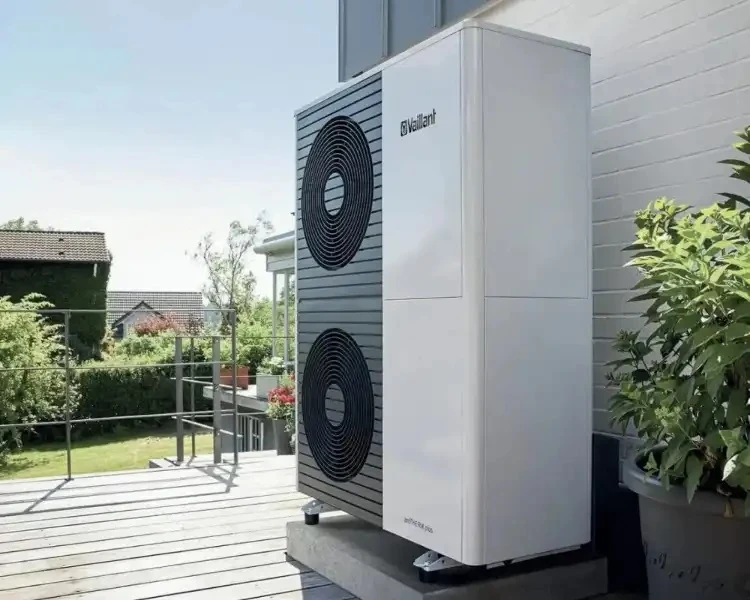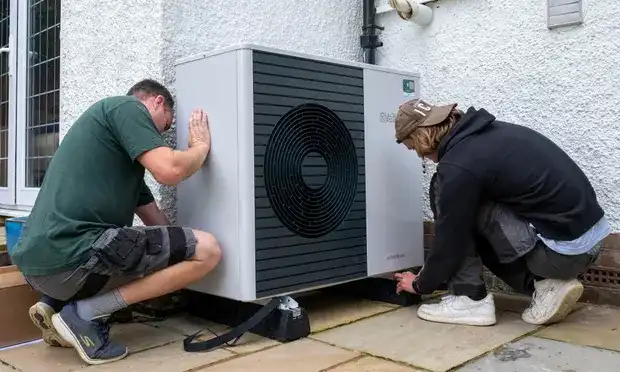How Air Source Heat Pumps Work
Heat Pumps
Published date: 10 June 2024 / Read time: 7 mins
HOW AIR SOURCE HEAT PUMPS WORK?
An air source heat pump is a good alternative to a conventional boiler and can help heat your home sustainably. Allowing you to generate your own renewable heat, an air source heat pump could help you save money on your energy bills.
The Department of Energy states that households can save around £100 every year when switching to a heat pump*. The main factors that affect potential savings include house size, the heating system they are replacing, local climate, house heat loss, and the efficiency of existing radiators and underfloor heating systems. As energy prices and tariff rates change, so will estimated costs and savings, and as renewables generation and access to heat pump-friendly tariffs increase, savings could improve. Switching from more expensive heating systems such as oil, LPG (liquid petroleum gas,) or direct electric heating systems to a heat pump is likely to have a bigger impact on your energy usage and heating bills.

*The expenses and potential savings linked to smart tariffs depend on several factors. Firstly, a smart meter is a prerequisite. Additionally, the specific tariff, your heating habits, the characteristics of your home (including type, size, and energy efficiency), and the efficiency of your heat pump all play a role.
The figures presented here are derived from dynamic simulation modeling of a typical 3-bedroom detached house with insulated cavity walls and a heat pump achieving a seasonal performance factor of 3.13. Savings calculations are based on Octopus Cosy tariff prices and the energy price cap in effect between July 2023 and July 2024, excluding any gas standing charges. It's important to note that both energy prices and tariff rates are subject to change, which will impact estimated costs and savings.
The benefits of a heat pump include:
- Carbon savings of up to 70% compared to a gas boiler.
- Bill savings of around £100 per year* compared to a gas boiler if used effectively with a smart tariff.
- They’re 3 times more energy efficient than traditional gas boilers.
- They reduce our reliance on imported gas, contributing to UK energy security.
- They’ll become greener every year as the UK electricity grid continues to decarbonise.
Source (January 2025): gov.uk
Here, our energy and renewables team at City Plumbing discusses what you need to know about air-source heat pumps, including the pros and cons of this innovative heating system.
What Are Air Source Heat Pumps?
Air source heat pumps take the heat from the air and, using a compressor, boost this air to reach a high temperature. This hot air is then transferred as heat to the home’s heating system. This process is similar to how a refrigerator works but just in reverse.
Working well in low temperatures, and even that of the UK’s temperamental climates, air source heat pumps are an energy-efficient way to heat a home. And, though they do also run on electricity, overall these clever inventions require less electrical energy when compared to the heat they produce.
How Many Types of Air Source Heat Pumps Are There?
There are two types of air-source heat pumps, including an air-to-water choice and an air-to-air choice. Both primary systems look extremely similar externally. Yet, each works differently and is therefore compatible with a different heating system type.

How Do Air-To-Air Heat Pumps Work?
An air-to-air heat pump works differently from air-to-water pumps, primarily because it can’t produce hot water. These heat pump types instead extract the heat from the air outside. They then feed it into the home through fans. So, to be able to help with moving this heat around the building a warm air circulation is required.
However, as an air-to-air heat pump doesn’t produce hot water, you’ll require some form of water heating system in your home, such as an immersion heater. Unfortunately, for those busy households with several members, air-to-water heat pumps tend to be favoured for this specific reason.
Yet, one bonus of an air-to-air heat pump is that it can work in reverse. This means they can be used as air conditioning units whenever the weather warms up. So, for those homeowners in warmer climates with fans already installed in the home, air-to-air heat pumps are good investments.
Where Can Air Source Heat Pumps Be Installed?
Air source heat pumps require an installation space that is usually outside the home and ensures the air can sufficiently circulate the entire unit. These units are usually placed to the rear of properties or down the sides of a property, albeit subtly.
A unit capable of housing a pump and hot water system is also required inside the property. For many homeowners, this tends to be a cupboard space once occupied by a boiler.
For best practice, it's advisable to speak with your home insurer provider beforehand to confirm if your policy covers changes made to existing heating systems. Planning permission is not usually required for air-to-water heat pumps. But, for those living in areas of conservation or listed buildings, local authority consent may be required.
Ultimately, it’s highly advisable to ensure that all local building regulations will be met before installing a new heat pump on any property.

Can Air Source Heat Pumps Provide Hot Water?
Air-to-water heat pumps provide a home with both central heating and hot water. Though these pumps won’t house the water, they do transfer heat from the air to water which is then stored in a cylinder in the home.
This whole process is undertaken by a compressor, condenser, expansion valve, and evaporator. Heat taken from the air by an air source heat pump becomes absorbed and passed into a heat exchanger. As the temperature rises, this heat is then transferred to water that's stored in the home. As a result, this water can be used in showers, baths, taps and radiators.
Can an Air Source Heat Pump Work With Underfloor Heating?
Finally, for houses with an underfloor heating system already installed, air-source heat pumps make for great additions.
An underfloor heating system evenly distributes water through a circuit of people beneath the flooring. And for those underfloor heating systems that have been professionally installed and consist of high-quality components, they will be able to operate at low temperatures. With air-to-water heat pumps working more effectively and efficiently at lower heating temperatures, the two create the perfect combination.
Replace Your Boiler With an Air Source Heat Pump For A More Energy-Efficient Home
A superb alternative to boilers, switching to an air source heat pump is a smarter way of reducing your home's overall energy usage while contributing to a greener future.
If you're looking to make the change, contact our Renewables Team at City Plumbing. Experts in the latest energy-efficient technologies, we're perfectly placed to help homes and businesses make the smooth transition to renewable technology.



